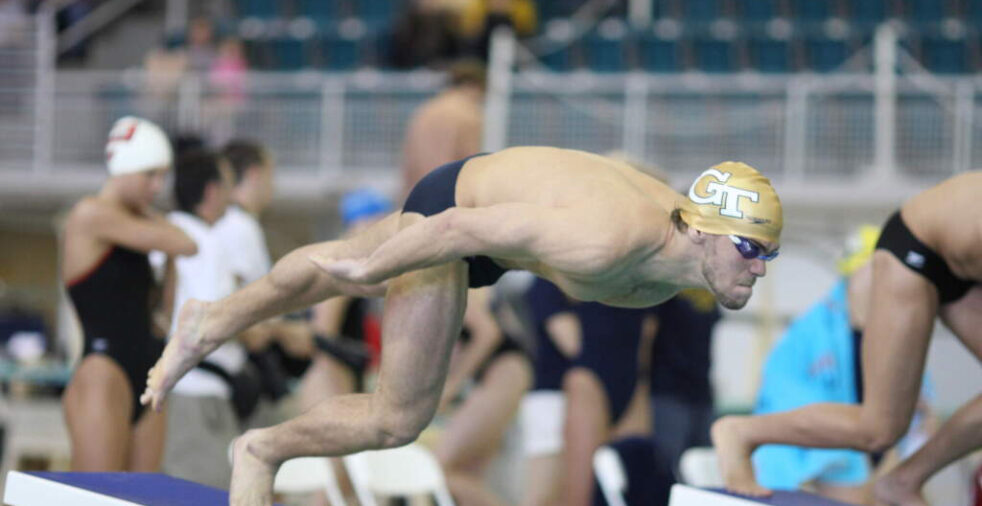On Aug. 17, Tech alum and Israeli Olympic swimmer Gal Nevo was one of the seven members inducted into Georgia Tech’s Athletic Hall of Fame. “He [Mike Stamus] reached out and wanted to have a conversation,” said Nevo in his exclusive interview with the Technique, “And my initial thought is ‘Oh, well they heard about my startup and wanted me to donate as an alum.’ It was a five minute conversation and I was like, wow.”
Nevo swam in three Olympic Games in Beijing (2008), London (2012) and Rio de Janeiro (2016) for Israel, swimming Individual Medley and Butterfly events.
While at Tech, he was a four time All-American, five time ACC champion, and still holds the school record in the 400 Individual Medley. Despite never medaling in the Olympics, he does hold the Israeli records for the 200 Individual Medley, 400 Individual Medley, and 200 Butterfly, all of which are some of the most physically taxing events on the body.
At the Olympic swim meet, the 400 IM is the first event on the schedule that swimmers medal in, and as of recently has been an event dominated by American swimmers at the Games.
At the London Games nine years ago Nevo was quite close to making the final in that event over legends Michael Phelps and Hungarian László Cseh. “[Phelps] swam super slow and basically swam [the same time as] László Cseh,” said Nevo, “[Phelps] was the last one into the finals.” Phelps would go on to finish 4th in that event, making it his first (and last) Olympic finals swim he did not medal in since his first Olympics as a 15 year old at the 2000 Sydney Games.
Nevo credits Phelps walking in the Opening Ceremonies and waving the flag for the American delegation for why he didn’t medal.
Nevo’s coach at Tech, Stu Wilson, was a big part of why he wanted to come to Tech. “We heard a lot of good things about him,” he said, “Especially from other Israeli swimmers. I wanted to start at Georgia Tech, but Stu only offered a basic scholarship.” He eventually transferred over to Tech for the 2008-2009 season after a couple of years at ASU.
Wilson left the team after Nevo’s first season at Tech, a year where he posted the second fastest 400 IM in NCAA history at the time. After Wilson left, Nevo credits assistant coach Mark Tuberin: “These people really, really made the difference.”
What might be enlightening but not surprising to Tech students is that the work ethic the student body is known for applies to the swim team as well.
“The team is very different from your typical top college teams,” said Nevo, “There’s a Hebrew saying ‘living in a movie’ which is like living in some kind of fantasy. [For swimming it’s like] you know, ‘we’re gonna win championships. We’re gonna get top ten!’ It’s dream and reality, a huge difference you can’t take seriously.”
This is coming from a guy who has made three Olympic games, so he knows what the dream is. He has achieved top 10 worldwide in an Olympic event. He has seen the athletes from small nations who are in awe of the Olympic Village and the unlimited Big Macs available for athletes.
“I think what’s special about Tech is that because it’s such an academically hard school, everyone is more down to earth. Everybody has dreams and aspires to get better, but … they know they’re going to come to Tech both to work hard in the classroom … and in the pool.”
While this is not news to anyone that has spent any time attending or teaching at the Institute, it is notable that this facet of Tech truly penetrates every area of student life on campus.
“Once I came to Arizona State, everything [was] the same and you get the same kind of people. But I really like [Tech’s] atmosphere of just, you know, do the hard work, have realistic dreams that you aspire to. That creates better dynamics, in my point of view.”
After his swimming career ended, Nevo began a startup called Senswim. He says it’s the “first video analysis system for swimming that is free of any wearable devices.
It gives real time feedback to swimmers and coaches about several metrics such as time, strokes, underwater, dive, distance, and hopefully more metrics soon.”
Senswim is the only company to ever establish a product with these kinds of stats without requiring a sensor of some kind that a swimmer would wear on their wrist or ankle. It’s a huge help for coaches, who could have a reliable system to track times without using a handheld stopwatch. One could even theoretically use security camera footage to make it work.
“I think for everyone, not just athletes, what you eventually want to have more than achievements is just appreciation.”
While usually the new class of the Athletic Hall of Fame are introduced on Grant Field during a home football game, this year’s class will be introduced alongside the 2021 class next season.
